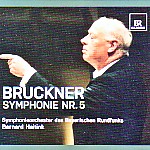The last time I checked, lines of music lovers weren’t exactly camping out on the street in advance of the release of this, Haitink’s third recording of this symphony. The other two were nothing special. The first was swift and nondescript, distinguished mostly by the characterful sonority of the Concertgebouw Orchestra. The second, with the Vienna Philharmonic, was slower and duller, but had its moments. This one starts out well enough but seems to pause with every entry of the opulently blended brass section, and this prevents the first movement from building any sort of satisfying momentum.
The Adagio, relatively swift at about 16 minutes, is the highlight of the performance; the scherzo’s trio section is beautifully shaped, with particularly lovely woodwind playing, but the outer sections lack sustained energy. Then comes the apocalypse: a finale with the slowest, dreariest, least transcendental coda ever preserved, to the eternal shame of the artists responsible. Recessed trumpets (never mind that they have the tune), flabby rhythms, and a tempo that just keeps on dying to the point where the symphony barely drags its weary carcass into the final page–all leave the most depressing impression imaginable. Life is way too short for this.
































